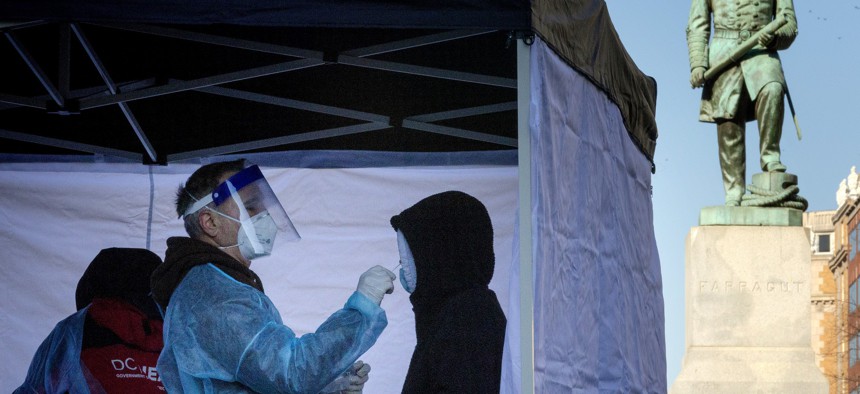Appeals court deals another blow to Biden's contractor vaccine mandate

COVID-19 testing at Farragut Square, just a few blocks from the White House. Chip Somodevilla/Getty Images
The U.S. Court of Appeals for the Sixth Circuit said in a Wednesday decision that Biden's mandate likely goes beyond authority given in the Procurement Act and denied the administration's request that an injunction in three states be lifted.
In the latest setback to the Biden administration's federal contractor vaccine mandate, the U.S. Court of Appeals for the Sixth Circuit on Wednesday denied the federal government's request to reverse an injunction blocking the mandate.
Any reversal in the Sixth Circuit would not have had much practical effect, since a nationwide stay of the contractor was ordered in a related case in Georgia. The contractor mandate was scheduled to take effect on Jan. 18, but the Georgia lawsuit resulted in a block in all states in December.
The Sixth Circuit's decision is the latest in a series of court actions challenging the White House's vaccine mandates for employees of government contractors, health care workers and Americans working at companies that employ more than 100 people.
The government has appealed that stay as well; a decision is pending in the 11th Circuit Court of Appeals. The court is on an expedited schedule to hear the case.
The Wednesday decision from the Sixth Circuit falls in line with that other appellate court action on the same question, said Alan Chvotkin, a partner at the law firm of Nichols Liu and a longtime specialist in government contracting law.
"Ultimately, it will be up to the Supreme Court to decide whether the president has authority to issue an executive order under the Federal Property Act and whether the Property Act is broad enough to allow for this contractor vaccine mandate," said Chvotkin.
The Jan. 5 ruling states that President Joe Biden likely overstepped his authority under the Federal Property and Administrative Services Act, commonly known as the Procurement Act, in issuing the mandate.
The law was "re-envisioned by the executive," wrote U.S. Circuit Judge John Bush, a Trump appointee, in the 2-1 majority decision, "An act establishing an efficient 'system of property management' was transformed into a novel font of federal authority to regulate the private health decisions of millions of Americans."
Judge R. Guy Cole Jr. dissented, writing that the government likely was in line with the Procurement Act.
"The health and safety of the government's workforce amid a global and worsening pandemic has direct and tangible effects on the economy, and, by extension, on the government's ability to procure and supply services," he wrote.
On Jan. 7, the Supreme Court will hear oral arguments in a proceeding centered on the COVID-19 vaccination mandates for private businesses and for health care workers in facilities that accept Medicare and Medicaid payments.
Although that proceeding likely won't offer clarity on the mandate for contractors, given differences between the cases, how the court rules in the emergency appeal to lift the blocks on these rules will still give "guidance to the Justice Department on the merits and proceedings on the contractor case," said Chvotkin.



